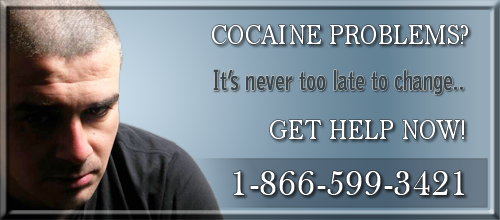About Cocaine
- What is Cocaine
- Effects of Cocaine
- Who Uses Cocaine
- Cocaine Statistics
- Cocaine Information
- Facts About Cocaine
- Dangers of Cocaine Use
- Signs of Cocaine Use
- About Cocaine
- Stages of Cocaine Addiction
- Cocaine Withdrawal
- Cocaine Overdose
- Cocaine Treatment
- Snorting Cocaine
- Smoking Cocaine
- Injecting Cocaine
- Crack Cocaine
- Using Cocaine with Alcohol
- Cost of Cocaine
- Cocaine Side Effects
- Cocaine Street Names
- Drug Tests for Cocaine
- History of Cocaine
- Cocaine User Pictures
- Cocaine Images

Signs of Cocaine Use
 At first, signs of cocaine use go unnoticed because they are subtle and hard to identify. As cocaine abuse escalates, the user's signs of cocaine use become more apparent and are easier to detect. For occasional users, the signs of cocaine use start as a nosebleed or increased heart rate. However with continual use, symptoms such as cardiac arrest and severe health problems may occur. Cocaine abuse and addiction can lead to hospitalization and death.
At first, signs of cocaine use go unnoticed because they are subtle and hard to identify. As cocaine abuse escalates, the user's signs of cocaine use become more apparent and are easier to detect. For occasional users, the signs of cocaine use start as a nosebleed or increased heart rate. However with continual use, symptoms such as cardiac arrest and severe health problems may occur. Cocaine abuse and addiction can lead to hospitalization and death.
A cocaine user can take cocaine several different ways. It can be absorbed through the skin after it is rubbed on mucous tissues. It can be inhaled by smoking, which includes crack. It can be injected into the vein, which is called mainlining. It can be taken intranasally, which is the most common means of cocaine consumption. Intranasally means snorting the cocaine through the nose. Lastly, it can also be taken orally, which is called chewing.
Cocaine use affects every part of the user from the way they think, act and feel. A major effect of cocaine on human behavior is its ability to change a person's moods. The user's desire to feel this effect again is what makes cocaine a drug of abuse. Research shows that cocaine produces a feeling of euphoria, or intense well-being. People feel more energetic and friendly when on cocaine. These effects occur whether a person inhales, injects or smokes cocaine.
A person who takes cocaine repeatedly will develop tolerance to many of its behavioral effects. When the original dose no longer has much of an effect, the user must take increasingly larger amounts of cocaine to achieve the high. These larger doses present greater risks to the user's heart and blood vessels.
Users of cocaine and other stimulant drugs claim that the drug improves their performance of many activities. No evidence exists to support this claim. In general, cocaine has little effect on performance except when a person is unable to perform up to usual standards because of fatigue. In this situation, cocaine can enable the person to perform as if he or she were not tired. But this effect lasts for only a short time.
An individual who is becoming addicted to cocaine will begin to show more and more signs of cocaine use. One sign that an individual has a cocaine abuse problem is when they begin to focus more and more of their energy on acquiring and using cocaine. One extremely detrimental cocaine abuse symptom is obsession or craving. Once a person has become addicted to cocaine, their mind and body have an obsession with the drug that is curbed only when the drug is found and used.
Cocaine addiction can take hold of an user in less than 2 weeks. Some research indicates that a psychological dependency may develop after a single dose of high-potency cocaine. As the person develops a tolerance to cocaine, higher and higher doses are needed to produce the same level of euphoria.
Common signs of cocaine use include:
- altered motor activities (tremors, hyperactivity)
- anxiety
- bloody nose
- confusion
- dilated pupils
- hallucinations
- increased energy
- panic
- paranoia
- rapid pulse and breathing
- stuffiness and runny nose
- talking rapidly
- tin foil, rolled up money (into a tube shape), straws (sometimes cut in half or at an angle)
Let’s look at some additional signs of cocaine use that are often displayed by the addict. The first sign is lack of money. You would be surprised, no shocked, at how expensive cocaine can be if you are addicted to it. An addict can spend a few hundred dollars in a single night easily. So, if a person is using cocaine a lot then they will begin to run short of money. Signs of this include having to borrow money from friends and family for food or gas. Coming up short for rent, bills, etc and also getting caught stealing money from friends and family.
Another one of the signs of cocaine use is weight loss. Crack addicts as well as powder cocaine addicts have trouble keeping a healthy weight. This is because cocaine is a stimulant that suppresses appetite. When a person is using cocaine they can go more than a day without getting hungry. Naturally this causes the cocaine addict to lose weight.
Finally, a person who is using cocaine will often lie and not come home when they said they would. Because cocaine is a stimulant, cocaine users sleep funny hours and stay up all hours of the night. A person might be expected home at 10 pm and not come home until 4 am. This is one of the more common signs of cocaine use.
